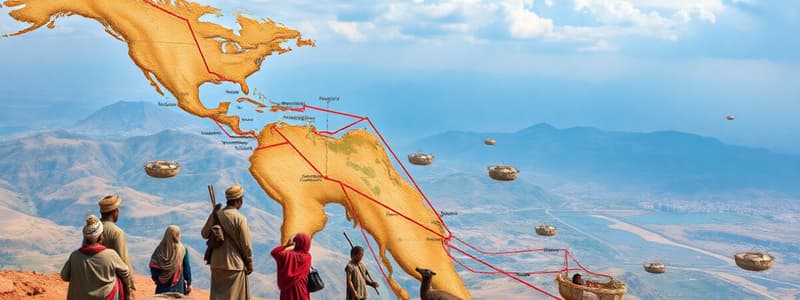Podcast
Questions and Answers
What significant factor has contributed to the interconnectedness of human societies throughout history?
What significant factor has contributed to the interconnectedness of human societies throughout history?
- Increase in population density
- Global policies on trade
- Technological advancements in communication
- Movement of people and goods (correct)
Which of the following was NOT a method through which globalization has developed historically?
Which of the following was NOT a method through which globalization has developed historically?
- Migration in search of work
- Travel for knowledge and spiritual fulfillment
- Coastal trade linking various civilizations
- Government treaties between countries (correct)
What form of currency was commonly used between the Maldives and other regions as early as 3000 BCE?
What form of currency was commonly used between the Maldives and other regions as early as 3000 BCE?
- Silver ingots
- Bartering
- Gold coins
- Cowries (correct)
When tracing the history of globalization, which century shows the noticeable long-distance spread of disease-carrying germs?
When tracing the history of globalization, which century shows the noticeable long-distance spread of disease-carrying germs?
Which group of travelers historically contributed to the spread of ideas and goods across regions?
Which group of travelers historically contributed to the spread of ideas and goods across regions?
Flashcards
Globalization's History
Globalization's History
Globalization, while prominent in the last 50 years, has roots in long-distance trade, migration, and the exchange of goods, ideas, and diseases over centuries.
Ancient Trade Networks
Ancient Trade Networks
Ancient societies engaged in extensive trade, with connections spanning continents like the Indus Valley to West Asia and the Maldives to China.
Historical Exchange
Historical Exchange
Historical interactions fostered the movement of goods, money, skills, ideas, inventions, and, unfortunately, diseases.
Early Globalization
Early Globalization
Signup and view all the flashcards
Transmission of Disease
Transmission of Disease
Signup and view all the flashcards
Long-Distance Travel
Long-Distance Travel
Signup and view all the flashcards
Study Notes
Globalization's History
- Globalization, though a recent economic system, has a long historical foundation built on trade, migration, and movement of capital.
- Human societies have steadily become more interconnected throughout history.
- Early travelers, traders, priests, and pilgrims traversed vast distances, carrying goods, money, ideas, and diseases.
- Evidence of extensive trade existed as early as 3000 BCE, linking the Indus valley with West Asia.
- Cowries, used as currency, were traded over vast distances, from the Maldives to China and East Africa.
- The spread of diseases also highlights long-distance interconnectedness, evident by the 7th century.
Studying That Suits You
Use AI to generate personalized quizzes and flashcards to suit your learning preferences.




